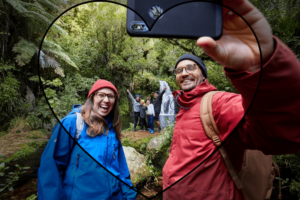No invitation required: Hedonic sustainability & meaningful tourism

What is ‘hedonic sustainability’ and ‘meaningful tourism’? Wolfgang Georg Arlt introduces and describes the terms in this “Good Tourism” Insight, which is a response to a “GT” Insight by his friend Thomas Bauer.
[Thanks to Dr Bauer for inviting Dr Arlt to write a “GT” Insight. And thanks to both of them for modelling the spirit of “GT”, where friends and colleagues can respectfully disagree over matters of great importance.]
Thomas Bauer has done a lot to support tourism: As a professor instilling in his students a sense of responsibility for the world they are selling, and as an expert and guide to Antarctica playing an important role in keeping the destination from being damaged by tourism.
I am honoured to call him a friend.
However, I dare to differ from Dr Bauer’s thought-provoking text in his “Good Tourism” Insight of May 19, 2020: “By invitation only: Sustainable tourism revisited”.
Also see Thomas Bauer’s “GT” Insight
“By invitation only: Sustainable tourism revisited”
I agree with Thomas’ description of tourism becoming a mass phenomenon, and of developing from a life-changing serendipitous activity for a few to a commercialised and commodified leisure activity for many.
However, I disagree with his proposed solution.
Before the pandemic, tourism had reached the tipping point of being perceived no longer as a provider of fun, peace, and jobs, but as a disruptive force creating pollution and destroying local cultures and habitat.
Unfortunately, the signs are all too obvious that all the good resolutions for a better tourism that many made during the pandemic have been quickly forgotten.
What to do?
Thomas offers the solution to have visitors travel to destinations “by invitation only”, using the examples of theatres, football stadiums, Olympic Games etc., where, as he claims, “visitors need to have an invitation from local authorities and a reservation”.
On one hand, it will be quite difficult and illegal to block all the entries to a country like, let’s say, Germany, or even a city like Berlin at least for EU citizens.
On the other hand it is not true that you need an invitation to visit a theatre or a football match. You need a ticket, which you have to buy.
Tourists have always been unpopular
“The merits of the railroad and the steamboat have been prodigiously vaunted, but they have afflicted our generation with one desperate evil; they have covered Europe with tourists.”
A commentator on the topic of ‘modern tourism’ in an issue of Blackwood’s Edinburgh Magazine, 1848
For the year 2022, the solution “by invitation only” — providing access to the well-connected and affluent while locking out all others — cannot be the answer.
To provide a positive solution for post-pandemic tourism development, the paradigm of ‘meaningful tourism’ has been developed.
It is based, next to ‘positive psychology’ and the ‘transformative experience economy’, on the concept of ‘hedonic sustainability’.
Whereas sustainable and responsible tourism in most cases offer negative proposals — what to do less of, or not at all, and to pay more for the privilege — without providing much benefit in return except for a clear conscience, the key elements of meaningful tourism are ‘quality’, ‘benefits’, and ‘satisfaction’ for all.
What is ‘hedonic sustainability’?
“Sustainability is not something you can push down people’s throats.”
Xavier Font
Danish architect Bjarke Ingels first coined the term ‘hedonistic sustainability’ in 2011. The basic idea is that sustainability can and should be pleasurable.
The core message of hedonistic sustainability is that products should:
- Be an indulgence due to their function;
- Be durable due to their quality; and
- Preserve more than they consume due to a sustainable supply chain.
Products that are pleasurable and sustainable remove the guilt associated with consumption and give both customer and company a new way to evaluate a product.
In his 2009 book Yes is more, Ingels criticised the “Commandments of Good Consumption”, putting his concept of “produce energy while driving” against the idea of reducing fuel consumption.
Don’t miss other “GT” content tagged with
“Sustainable tourism & regenerative tourism”
However, the term ‘hedonistic’ in the popular discourse is often wrongly reduced to simply meaning selfish pleasure-seeking and over-indulgence.
An alternative is provided with the word ‘hedonic’. Hedonic sustainability is used to transfer the concept from Ingels’ approaches to architecture and city planning to a discussion about meaningful tourism.
What is ‘meaningful tourism’?
‘Meaningful travel’ has been promoted by tour operators who try to maintain a distinction between ‘good travellers’ and ‘bad tourists’. They carefully avoid the term ‘tourism’ in their offers and promotions.
However, as European Travel Commission CEO Eduardo Santander points out in an online meaningful tourism training programme, the better ‘new normal’ for travel & tourism needs to cover all people going abroad, not just the elite few who see themselves as ‘travellers’ and look down on ‘tourists’.
Don’t miss other “GT” content tagged with
“Community-based tourism”
The meaningful tourism paradigm takes into consideration that the importance of tour operators is decreasing; that the share of non-Western and senior travellers is growing; and that the most oft-cited reasons to travel, even within the leisure segment, is moving away from relaxation to experience.
Meaningful tourism is based on a return to quality, benefits, and satisfaction for all stakeholders — namely guests, host communities, employees of service providers, companies, governments, and a livable environment for future generations — with quality and satisfaction measured by the stakeholders themselves.
In a nutshell, the positive effects and benefits for all stakeholders involved, include:
- For guests/visitors to enjoy tourism services, creating satisfaction based on the benefits of the products which are more precisely adapted to their specific demands, going beyond relaxation and sightseeing towards new experiences;
- For host communities to benefit from encounters with visitors;
- For staff in tourism and hospitality service companies to benefit from better year-round working conditions, recognition as hosts instead of servants, meaningful work, and full-time careers;
- For service providing companies to have a sustainable perspective, with year-round business, motivated staff, higher margins, and lower marketing costs thanks to word-of-mouth recommendations by satisfied guests;
- For governments to obtain employment opportunities for their citizens, enjoy increased tax income, generate a more even spatial and temporal distribution of tourism, and foster friendly international relations; and
- For future generations to see mitigated environmental, social, and cultural damage based on a feeling of embeddedness and belonging by all stakeholders.
Guests who are provided with exactly what they want — and even a bit of what they did not know they want — will turn into product ambassadors, providing free word-of-mouth recommendations that are much more effective than expensive and decreasingly efficient offline and social media marketing channels.
Host communities will see the advantages of welcoming and interacting with visitors who are both interested and interesting.
Employees will value better pay and year-round jobs with the possibility to feel like hosts again instead of servants.
Companies will be able to ask for higher prices against perceived better quality, will be better able to use their resources year-round, and will have fewer problems in retaining and training their staff.
Don’t miss other “GT” content tagged with
“Policy & governance”
Governments will receive more tax revenue from tourism, and will be able to more effectively use tourism as a regional development tool.
With a feeling of belonging in the sense of a kinship economy, guests and hosts alike can be expected to treat the natural environment with more care.
In conclusion, the implementation of meaningful tourism will keep the doors open without the need for an invitation. And it will help to make tourism more joyful in what is probably the last century of mankind.
What do you think? Share a short anecdote or comment below. Or write a deeper “GT” Insight. The “Good Tourism” Blog welcomes diversity of opinion and perspective about travel & tourism because travel & tourism is everyone’s business.
Featured image (top of post): Could the vineyards and wind farms of Mölsheim, Germany represent a vision of hedonic sustainability and meaningful tourism? Image by Karsten Würth (CC0) via Unsplash.
About the author

Wolfgang Georg Arlt is CEO of COTRI China Outbound Tourism Research Institute, based in Hamburg, Germany, and Director of the Meaningful Tourism Center.





